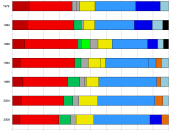In this essay, I am going to talk about the reasons that firms may decide to collude, the factors that help and prevent collusion, the types of collusion and a case study (OPEC) which illustrate the points.
In an Oligopoly industry, there are only a few firms between them share a large proportion of the industry. Unlike firms under Monopolistic, there are various barriers to the entry of new firms, the size of the barriers, however, will vary from industry to industry. Because of the small numbers of firms under oligopoly, each firm will have to take account of the others, they are interdependent. This means that each firm is affected by its rivals' actions. If one firm changes its product price or alters another part of its marketing strategy, it will have significantly impact in the rival firms. In other words, if one firm lowers its prices, the other firms in this industry will be affected, and they most likely will lower their prices, too.
If this happens neither company will gain a competitive advantage. Therefore, no firm can afford to ignore the actions and reactions of other firms in the industry.
Under oligopoly, the interdependence of firms may make them wish to collude with each other. If they could club together and act as if they were a monopoly, they could jointly maximise industry profits. On the other hand, they will be tempted to compete with their rivals to gain a bigger share of industry profits for themselves.
When firms under oligopoly engage in collusion, they may agree on prices, market share, advertising expenditure and so on. It will reduce the fear of engaging in competitive price cutting or retaliatory advertising, both of which could reduce total industry profits. Then the cartel (a formal collusive agreement) or...


